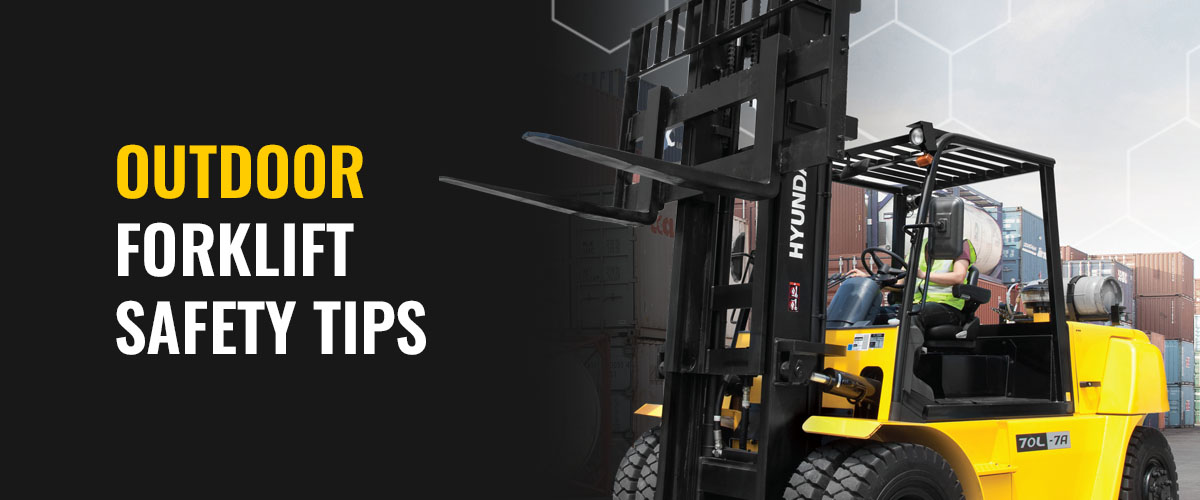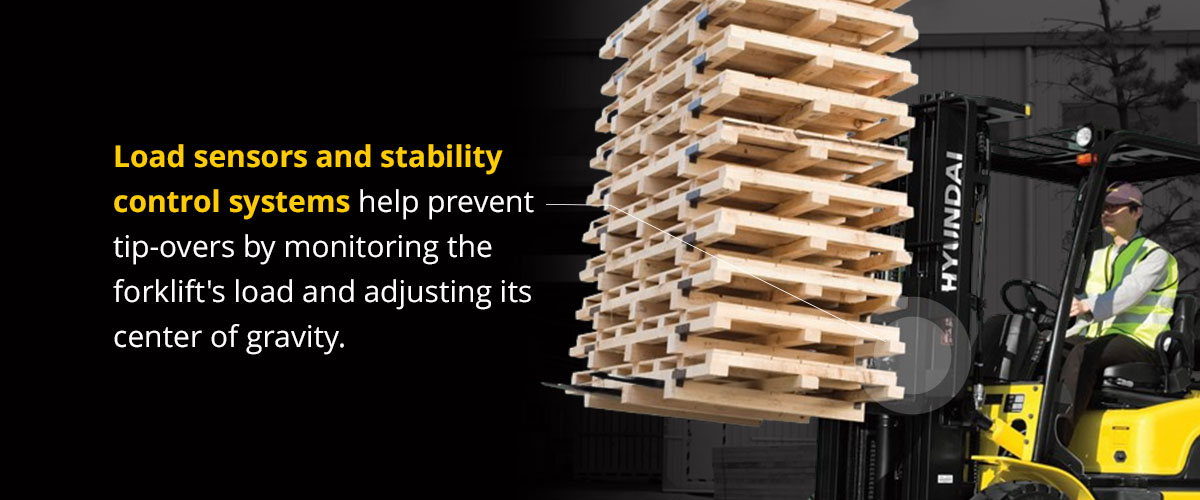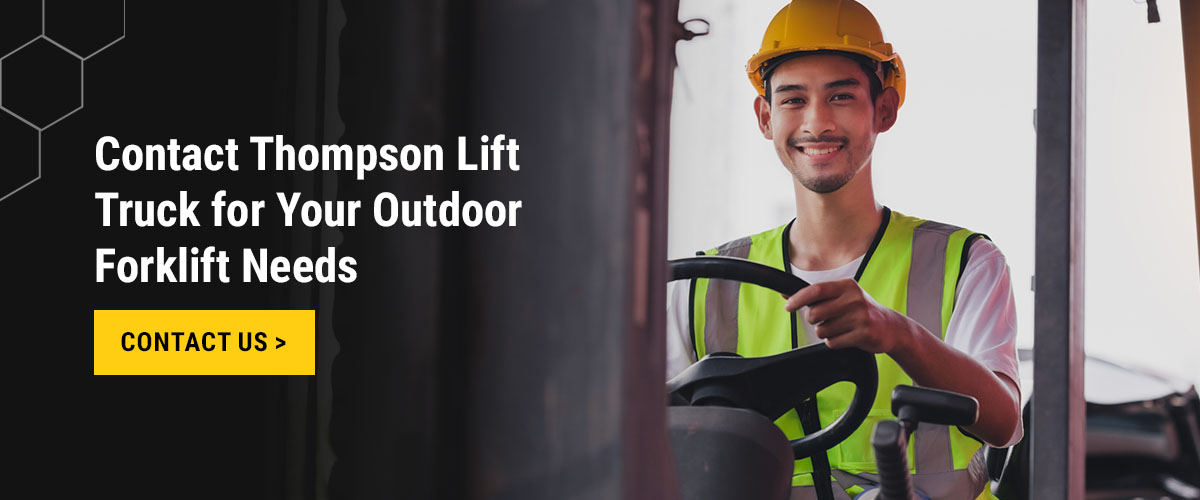
Outdoor Forklift Safety Tips
Outdoor forklifts are essential to many industries, seamlessly navigating rugged terrain and extreme weather to keep businesses running smoothly. However, using this powerful equipment in an ever-changing environment demands a heightened focus on safety.
Unlike their indoor counterparts, outdoor forklifts contend with uneven ground and unpredictable weather. Neglecting safety protocols in outdoor forklift operations can lead to accidents, injuries, and costly downtime.
In this guide on outdoor forklift safety, we explore valuable tips and best practices to ensure the well-being of operators, protect your equipment investment, and enhance overall operational efficiency.
Choose the Correct Forklift Style
The terrain, typical weather conditions, and the specific tasks your forklift will handle all play into determining the appropriate forklift style for outdoor operations. Here’s what you need to consider:
- Counterbalance forklifts: These lift trucks come in electric and internal combustion engine (IC) variants, making them adaptable to various situations. They provide stability and are suited for tasks like moving palletized loads, handling goods in shipping yards, and transporting materials across outdoor work sites.
- Rough terrain forklifts: Rough terrain models are ideal for uneven or rough outdoor terrain, construction sites, and agriculture. They have large, rugged tires to navigate uneven ground, gravel, mud, and snow.
- Telehandlers: Telehandlers, also known as telescopic handlers, offer the advantage of extended reach. They’re invaluable in outdoor settings where you must lift materials to elevated areas, such as roofing, landscaping, or construction. Their telescopic boom allows for increased reach and flexibility in handling various loads.
- All-terrain forklifts: These models are equipped with features like four-wheel drive and heavy-duty tires designed for off-road applications. They excel in remote construction sites, forestry operations, and anywhere that demands exceptional mobility and stability.
- Electric forklifts with outdoor kit: Electric forklifts can serve as a quieter, more eco-friendly alternative to IC models when equipped with an outdoor kit. They are ideal for noise-sensitive areas such as residential neighborhoods, parks, or outdoor events.
Consider Your Forklift’s Tire Type
Different outdoor forklift tire types are designed to address specific outdoor conditions, and selecting the appropriate ones can significantly impact safety and efficiency. Here are the primary forklift tire types to consider for outdoor use:
- Pneumatic tires: Pneumatic tires are similar to those on trucks or cars, consisting of a rubber outer layer filled with air. This air cushioning provides excellent shock absorption and traction, making these tires ideal for navigating gravel, dirt, and other uneven outdoor surfaces.
- Solid pneumatic tires: Solid pneumatic tires are highly durable and puncture-resistant, making them suitable for outdoor settings where debris or sharp objects might threaten tire integrity. These tires are often chosen for their longevity and resilience in harsh conditions.
- Cushion tires: Cushion tires also have a solid rubber construction, but they are smoother than solid pneumatic types. They are most suitable for relatively flat, even ground. While they may not provide the same shock absorption as pneumatic tires, cushion tires offer high maneuverability. They are commonly used in warehouse yards or outdoor areas with concrete or asphalt surfaces.
- Ribbed tires: Ribbed tires have deep grooves and a unique tread pattern that enhances stability and traction. They are commonly used in environments where outdoor surfaces may be uneven or slippery, such as on construction sites or in lumber yards.
Utilize Equipment With Advanced Safety Features
Investing in the latest outdoor forklifts to take advantage of advanced safety features is a proactive step toward ensuring a secure and efficient workplace. These features safeguard operators and pedestrians and contribute to smoother operations and reduced downtime. Here are some key advanced safety features to consider when selecting or operating outdoor forklifts:
- Rollover Protection Systems (ROPS) and Falling Object Protection Systems (FOPS): ROPS provides a protective structure that guards against the risk of the forklift tipping over, while FOPS protects operators from falling objects. These features support operator safety in challenging outdoor conditions.
- Seatbelts and operator restraint systems: Seatbelts are fundamental safety devices. They keep operators securely in their seats, reducing the risk of ejection during sudden stops or accidents. Many modern forklifts have comfortable operator restraint systems that maintain safety without impeding motion.
- Backup alarms and cameras: Audible backup alarms alert pedestrians and other workers to the forklift’s movement, reducing the risk of accidents. The cameras provide operators with a clear view of the surroundings, especially in blind spots, improving visibility and safety during outdoor maneuvers.
- Load sensors and stability control systems: Load sensors and stability control systems help prevent tip-overs by monitoring the forklift’s load and adjusting its center of gravity. These systems enhance stability and are particularly valuable when handling heavy loads in uneven outdoor terrain.
Consider Outdoor Forklift Rental as Needed
Renting a rough terrain forklift is often the best choice for outdoor projects your owned fleet is not equipped to handle. When your work demands flexibility, cost-effectiveness, and access to specialized equipment, renting a purpose-built lift truck is often the best way to go.
Working with a trusted rental provider will allow you to:
- Maintain a lean fleet: Renting is a solution if short-term or seasonal outdoor projects require additional lifting capacity or specialized capabilities. Renting provides access to the equipment you need for the project’s duration without a long-term purchase commitment. Rough terrain forklift rentals are ideally suited for outdoor tasks like construction, landscaping, or event setup, as they provide the lifting power and stability required for these projects without making a permanent addition to your equipment fleet.
- Simplify budgeting: If you want to avoid the upfront capital expenditure and ongoing maintenance expenses of purchasing a rough terrain forklift, you should consider renting. Equipment rentals typically come with fixed costs, making budgeting straightforward and allowing you to stay flexible in how you allocate funds. Additionally, you don’t have to worry about ongoing maintenance expenses or the depreciation of an owned machine.
- Access a variety of equipment: Rent if you require access to a specific model or type of rough terrain forklift for a particular outdoor task. Different outdoor projects may call for varying forklift specifications, such as load capacity, reach or terrain capabilities. Renting provides the flexibility to choose the most suitable machine for each project without the constraints of ownership.
Contact Thompson Lift Truck for Your Outdoor Forklift Needs
The choice of equipment is a decision that influences safety, efficiency, and overall productivity. Thompson Lift Truck provides some of the best solutions on the market, plus convenient locations across the Southeast.
Partner with Thompson Lift Truck for outdoor forklift solutions that meet and exceed your expectations. With our extensive knowledge of forklift safety and comprehensive inventory, we’re here to ensure that your outdoor operations run smoothly, efficiently, and with the right equipment.
Reach out to us today to rent or purchase forklifts for your project. Your success is our priority, and we’re here to provide the support you need to get the job done.



